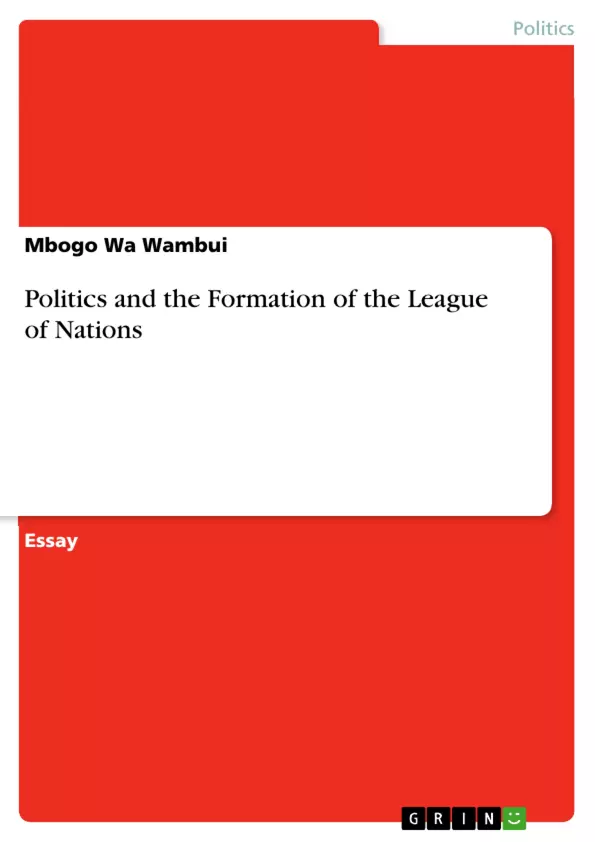This essay analyses the historical significance of the balance of power system in the formation and function of the league of nations. Balance of Power simply means state of equilibrium. That is, a peaceful world system with no state intervention in another. There was perfect balance of states especially between 1648 and 1914. The system is significant as Europe achieved a fair degree of stability not based on conquest or domination by a single power. It was uniquely accommodative, plural and embraced great powers in conformity with modern ideas of state nationalism. Factors that led to the Balance of Power include: no dramatic technological innovation in war industry that exists today like nuclear weapons, plenty of room for economic development and overseas expansion used as a safety valve enabling states increase power without endangering rivals at home.
Inhaltsverzeichnis (Table of Contents)
- The Balance of Power System
- Peter the Great and the Rise of Russia
- Louis XIV and the Expansion of France
- Frederick the Great and the Rise of Prussia
- Napoleon Bonaparte and the French Empire
- The Industrial Revolution and Competition
- The Outbreak of the First World War
- The Treaty of Versailles and the League of Nations
- The Functions of the League of Nations
- The Decline and Failure of the League of Nations
Zielsetzung und Themenschwerpunkte (Objectives and Key Themes)
This text examines the historical significance of the Balance of Power system in the formation and function of the League of Nations. It traces the evolution of the system from its origins in early modern Europe to its ultimate failure in the face of rising nationalism and aggression in the 20th century.
- The Balance of Power System in European History
- The Rise of Nationalism and Imperialism
- The First World War and its Aftermath
- The Establishment and Functions of the League of Nations
- The League's Weaknesses and its Ultimate Failure
Zusammenfassung der Kapitel (Chapter Summaries)
- This chapter introduces the concept of the Balance of Power system and its importance in maintaining peace and stability in Europe. It explains that the system was characterized by a state of equilibrium between major powers, ensuring that no single state could dominate the continent.
- This chapter focuses on the reign of Peter the Great, who sought to modernize Russia and expand its territory by securing access to the sea. It explores his conflicts with the Ottomans and Swedes, which ultimately contributed to Russia's rise as a major European power.
- This chapter examines the reign of Louis XIV of France, who aimed to establish French dominance over Europe. It discusses his wars and territorial gains, as well as his absolutist policies, which shaped France's role in the European power balance.
- This chapter focuses on the reign of Frederick the Great of Prussia, who believed in the importance of military power. It describes his wars with Austria and his successful pursuit of expansionist policies, leading to the rise of Prussia as a major European power.
- This chapter examines the rise of Napoleon Bonaparte and his conquest of Europe. It describes his victories and defeats, ultimately leading to his downfall at the Battle of Waterloo. It explores the impact of his reign on the European power balance and the rise of nationalism.
- This chapter discusses the impact of the Industrial Revolution on the European power balance. It explains how increased industrialization led to competition for resources and markets, ultimately contributing to the rise of tensions and rivalries between major powers.
- This chapter examines the causes of the First World War, tracing it back to the growing tensions between European powers. It highlights the role of nationalism, imperialism, and the arms race in escalating the conflict.
- This chapter discusses the Treaty of Versailles, which formally ended the First World War. It explores the harsh terms imposed on Germany, including territorial losses, disarmament, and war guilt, which ultimately contributed to the rise of Nazi Germany.
- This chapter explores the establishment and functions of the League of Nations, an organization created in the aftermath of the First World War to promote international cooperation and prevent future conflicts. It describes its role in overseeing mandated territories and its efforts to address social issues.
Schlüsselwörter (Keywords)
This text explores key concepts such as the Balance of Power system, nationalism, imperialism, the First World War, the Treaty of Versailles, the League of Nations, international cooperation, and the rise of fascism.
Frequently Asked Questions
What was the Balance of Power system?
It was a state of equilibrium in Europe where no single nation could dominate others, maintaining stability through alliances and diplomatic checks between 1648 and 1914.
Why was the League of Nations formed?
It was established after World War I to promote international cooperation, prevent future conflicts, and oversee mandated territories under the Treaty of Versailles.
What role did the Industrial Revolution play in international tensions?
The Industrial Revolution increased competition for resources and markets, leading to heightened rivalries and an arms race among major European powers.
How did the Treaty of Versailles impact Germany?
The treaty imposed harsh terms including territorial losses, disarmament, and heavy reparations, which contributed to social unrest and the rise of Nazi Germany.
Why did the Balance of Power system eventually fail?
The rise of aggressive nationalism, imperialist ambitions, and the lack of a central authority to enforce peace led to its collapse and the outbreak of World War I.
- Citar trabajo
- Mbogo Wa Wambui (Autor), 2010, Politics and the Formation of the League of Nations, Múnich, GRIN Verlag, https://www.grin.com/document/900958



